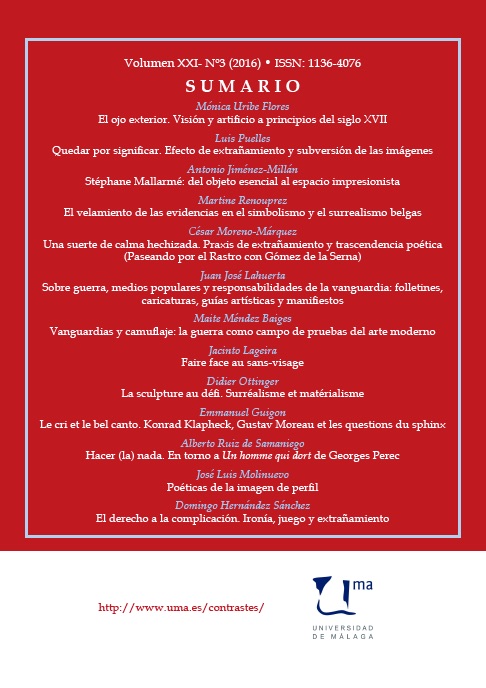About war, popular media and responsabilities of the avant-garde: leaflets, caricatures, guidebooks and manifests
DOI:
https://doi.org/10.24310/Contrastescontrastes.v21i3.2431Keywords:
War, Avant, Garde, Futurism, Marinetti, CartoonAbstract
During World War, and in the years before and after, a large number of art and literature is dedicated to the exaltation of conflict, its justification, its lament. This literature and this art is therefore in all strata of society: from sentimental series, tales and comic books, war stories of grand consumption or guidebooks of the battle field, to novels and poems of great authors; from popular cartoons to works by renowned artists. All have a common denominator: the terrible impoverishment of language, on the one hand, and the other, the conviction by some intellectual elites that there is nothing to say, in any case. In the world of imperfect nihilism that results from all this appears a great responsible factor: the avant-garde, that sees in war the performing of some of its fantasies, all related to the will of destruction.Downloads
Metrics
Publication Facts
Reviewer profiles N/A
Author statements
Indexed in
-
—
- Academic society
- N/A
- Publisher
- Universidad de Málaga
Downloads
Published
How to Cite
Issue
Section
License
This journal provides immediate free access to its content under the principle of making research freely available to the public. All content published in Contrastes. Revista Internacional de Filosofía, are subject to the Creative Commons Attribution-NonCommercial-ShareAlike 4.0 license whose full text can be found at <http://creativecommons.org/licenses/by-nc-sa/4.0>
It is the responsibility of the authors to obtain the necessary permissions of the images that are subject to copyright.
Authors whose contributions are accepted for publication in this journal will retain the non-exclusive right to use their contributions for academic, research and educational purposes, including self-archiving or repository in open access repositories of any kind.
The electronic edition of this magazine is edited by the Editorial Service of the University of Malaga (Uma Editorial), being necessary to cite the origin in any partial or total reproduction.










5.png)
